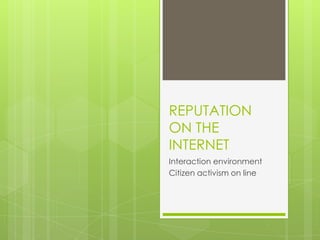
Web 2.0 & Citizen Activism
- 1. REPUTATION ON THE INTERNET Interaction environment Citizen activism on line
- 2. Interaction environment What impact does the Internet have in your own life? What do you use the Internet for? Why is your generation called the NetGen? What’s the difference between Web 1.0 and Web 2.0?
- 3. The first implementation of the web represents the Web 1.0, considered the "read-only web." The early web allowed us to search for information and read it, but there was very little user interaction or content contribution.
- 4. Web 1.0 was an early stage of the conceptual evolution of the World Wide Web, centered around the top down* approach over the use of the web and its user interface.
- 5. (*A top-down approach is the breaking down of a system to gain insight into its compositional sub-systems. In a top-down approach an overview of the system is formulated, specifying but not detailing any first-level subsystems. Each subsystem is then refined in yet greater detail, sometimes in many additional subsystem levels, until the entire specification is reduced to base elements.)
- 6. Technically, Web 1.0 webpage's information is closed to external editing. Information is not dynamic, updated only by the webmaster.
- 7. Second generation of the World Wide Web Web 2.0 Focused on the ability for people to collaborate and share information online. Web pages are more dynamic The Web is more organized and based on serving Web applications to users.
- 8. BLOGS They can help elect presidents, launch new products, expose tendencies, create public opinion, etc. Most good quality blogs are interactive, allowing visitors to leave comments and message each other.
- 9. Types of blogs Personal Corporate and organizational By genre: political, health, fashion, travel, education, etc. By media type: vlog (videos), linklog (links), photoblog (photos), sketchblog (sketches), etc. Blog search engines Etc.
- 10. Interactive Journalism Consumers directly contribute to the story. Through Web 2.0 technology, reporters can develop a conversation with the audience. Newspapers decline circulation as people get news on the Internet for free. You Tube: How NY Times fuels interactive journalism - http://www.youtube.com/watch?v=KfXu8pC W2-g
- 11. How Obama’s Internet Campaign Changed Politics Facebook,MySpace and You Tube to announce events, rally volunteers and raise money.
- 12. John F. Kennedy’s use of television helped him win the presidency. Barack Obama’s use of the new media helped him win the elections. He used You Tube for free adverts: BarackObama.com - http://www.youtube.com/user/barackob amadotcom?feature=results_main
- 13. Obama's campaign won praise for its innovative use of social-networking sites, including Facebook, MySpace and MyBarackObama.com, to announce events, rally volunteers and raise money.
- 14. Political consultant Joe Trippi said: “Mr. Obama used the Internet to organize his supporters in a way that would have in the past required an army of volunteers and paid organizers on the ground”. The New York Times, Bits, Claire Cain Miller, November 7, 2008 - http://bits.blogs.nytimes.com/2008/11/07/how-obamas-internet- campaign-changed-politics/
- 15. “The campaign’s official stuff they created for YouTube was watched for 14.5 million hours,” Mr. Trippi said. “To buy 14.5 million hours on broadcast TV is $47 million.”
- 16. Social networking sites Some of the most common: Facebook Twitter Linkedin Flickr
- 17. Internet and citizen participation Does the Internet exacerbate political polarization? Does the Internet empower ordinary citizens vis-à-vis political elites? Can the Internet help activists to topple dictators?
- 18. Political science paid little attention to the Internet until recently. This is changing today. Scholars are beginning to study how the Internet may be affecting politics.
- 19. The spread of the Internet increases citizen participation and democracy.
- 20. CASE STUDY: The Arab Spring and the use of the Internet
- 22. The Arab Spring is the name given to the revolutionary wave of demonstrations and protests in the Arab world that started on December 18, 2010.
- 23. Sources Postman, Joel: SocialCorp, Social Media Goes Corporate, New Riders, Berkeley, California, 2009. Practical E Commerce: http://www.practicalecommerce.com/articles/464-Basic- Definitions-Web-1-0-Web-2-0-Web-3-0 The Consequences of the Internet for Politics , Annual Review of Political Science, Vol. 15: 35-52 (Volume publication date June 2012) - http://www.annualreviews.org/eprint/9cMTd7KbkxQxxfWHas7 c/full/10.1146/annurev-polisci-030810-110815 © Inés Scudellari 2012
